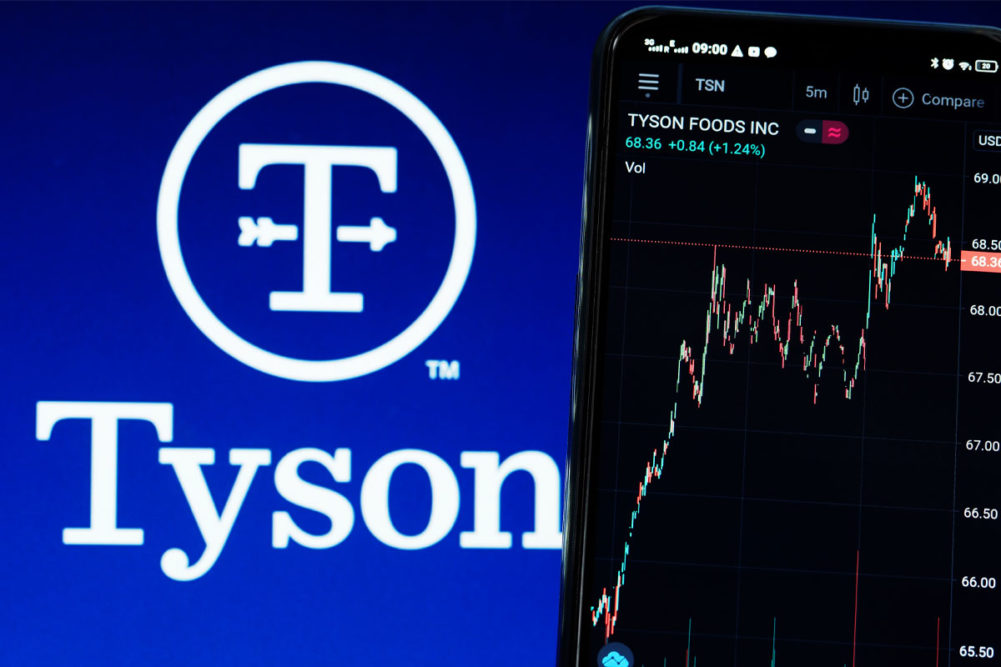SPRINGDALE, ARK. — “Controlling the controllables” was a phrase used often during Tyson Foods, Inc.’s most recent conference call with securities analysts. The company’s full-year and fourth-quarter earnings show there was much during the period that may have been out of the company’s control that hindered both earnings and sales.
The meat and poultry processor recorded a loss of $648 million for the fiscal year ended Sept. 30, a stark difference to fiscal 2022 when the company earned $3.25 billion, equal to $9.18 per share on the common stock.
Annual sales ticked down to $52.9 billion from $53.3 billion the year before.
For the fourth quarter, Tyson Foods recorded a loss of $450 million, down significantly from the year before when the company earned $538 million, equal to $1.54 per share. The fourth-quarter loss follows a loss of $417 million during the third quarter ended July 1.
Fourth-quarter sales were $13.3 billion, down from $13.7 billion during the fourth quarter of fiscal 2022.
Items affecting profitability during the quarter ranged from an impairment charge of $333 million in the Beef business unit, fewer beef cattle coming to market, high input costs and a strong US dollar that affected exports.
In the Beef segment, the company’s largest business unit, fourth-quarter sales rose to $5 billion from $4.9 billion the year before. The unit recorded a loss of $323 million compared with operating income of $375 million in fiscal 2022.
“Coming into fiscal ‘23, we expected Beef to be under pressure due to limited cattle supply,” said Donnie D. King, president and chief executive officer, on Nov. 13. “This trend held true as cattle costs appreciated at a faster rate than the wholesale price of boxed beef, eroding export opportunities due to a strong US dollar and low price of competing exporters and ultimately creating a very tight spread scenario.
“We also expected to see signs of rebuilding of the herd to surface as cattle prices moved higher. However, this did not materialize. Until significant heifer retention and subsequent herd rebuilding takes place, we expect challenging supply conditions to remain.”
Tyson Foods’ Chicken business unit recorded a loss of $267 million during the quarter that compared unfavorably to fiscal 2022 when the business unit’s operating income was $340 million during the fourth quarter. Segment quarterly sales fell to $4.2 billion from $4.6 billion the year before.
The Chicken business has been a challenge for Tyson Foods, prompting the company to restructure throughout the year by closing processing plants in Van Buren and North Little Rock, Ark.; Dexter and Noel, Mo.; Glen Allen, Va.; and Corydon, Ind.
“Not only did we hold on to the operational enhancements we made in Q3, we made incremental improvements in yield and in our live operations,” Mr. King said. “This allowed us to take advantage of improving market conditions, including lower grain costs, leading to a positive margin to end the year. As we head into a new fiscal year, we expect a better outlook for input costs while seeing the benefits of some of the bold actions we took this year.”
Prepared Foods operating income was $118 million during the quarter, up from $111 million the year before. Segment sales were flat at approximately $2.5 billion.
“Our brands continue to outpace the broader food and beverage category in volume growth across the retail channel in Q4,” Mr. King said. “Our volume grew while the overwhelming majority of food and beverage peers saw volume declines. Our core business lines, including the iconic retail brands, Tyson, Jimmy Dean, Hillshire Farm and Ball Park, saw Q4 volume growth of 3.2% versus last year, far outpacing our competition.”
Tyson’s Pork business recorded a loss of $11 million during the quarter, an improvement over the year before when the unit recorded a loss of $55 million. Sales fell to $1.5 billion from $1.6 billion in 2022.
“As you know, in fiscal ‘23, the industry suffered from supply and demand imbalances, which negatively impacted spreads,” Mr. King said. “While we are seeing some signs of improving spreads and lower grain costs, there is still an imbalance between supply and demand of pork. Our team is focused on running the business as efficiently as possible while continuing to review all the options.”
In fiscal 2024, Tyson Foods is guiding an adjusted operating income of $1 billion to $1.5 billion, and sales to be flat when compared to fiscal 2023.





